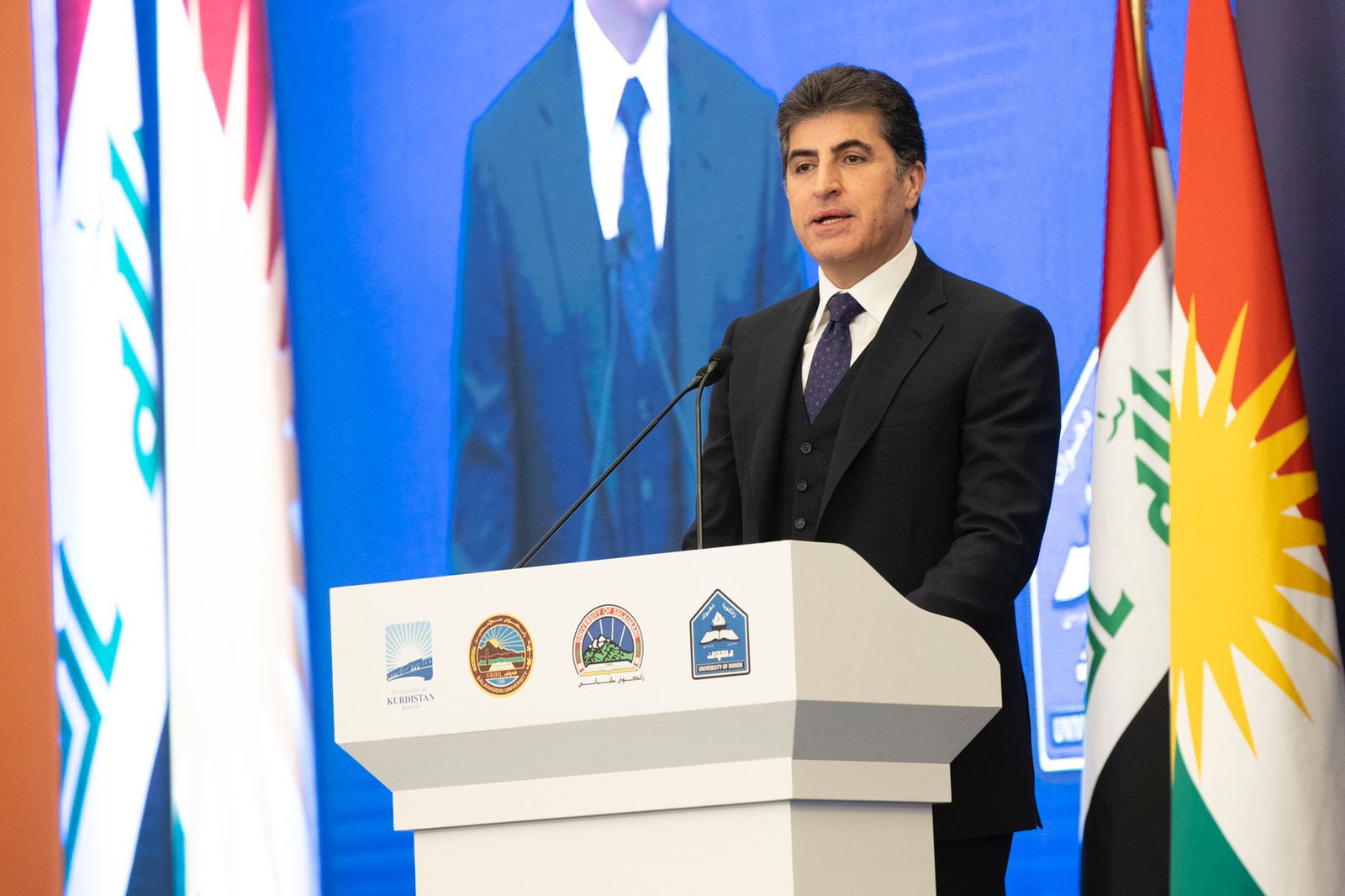
2021-11-28T11:57:44.000000Z
Erbil, Kurdistan Region, November 28, 2021
Kurdistan Region President Nechirvan Barzani participated in the “Gender Equality & Women’s Empowerment Strategies: The Case of the Kurdistan Region of Iraq" conference in Erbil on Sunday. The conference was a joint collaboration of four universities of Sulaimani, Dohuk, Erbil and Kurdistan.
The President delivered the opening speech of the conference which was attended by a large group of foreign and domestic guests, experts and academics.
Below is a readout of President’s speech:
Ladies and Gentlemen,
Good morning and welcome all to this conference.
I’m delighted that we, together, take part in this conference on “Gender Equality & Women’s Empowerment Strategies: The Case of the Kurdistan Region of Iraq” which is part of a national campaign to stop violence against women.
I congratulate the universities of Sulaimani, Dohuk, Salahadin and Kurdistan for this joint partnership of special significance for the Kurdistan Region. The collaboration among four universities on a subject like this, is encouraging and an important step forward. Cooperation and partnership among all universities across the Kurdistan Region need to continue on this subject. Hopefully, this conference produces good outcomes and recommendations that will be of great future use for this important mission that has been started in the Kurdistan Region.
I want to welcome all the esteemed guests who have arrived here; I welcome them without saying their names. I welcome them and wish them a great time in Erbil.
Ladies and Gentlemen,
The subject of equality between males and females, boys and girls, men and women is at its core a political issue and related to the individual’s rights in society. If everyone is to equally enjoy their rights, then no gender should marginalize, overlook, deprive, oppress or violate the other.
There are many factors behind the oppression against women in our society, including forced marriages, honor killing, rape, domestic violence and violence outside family, marginalization and subjugation.
Parts of these acts are connected to the wrongful practices of traditions. When we take a stance against these practices, we reduce the oppression against women, and at the same time we erase a harmful cultural norm among us. Other factors may be the misinterpretation of religion. When we outlaw these practices, not only do we protect women, but we also protect religion from such misinterpretations.
What I want to say is that right from the elementary school, our children must be introduced to this culture.
Other considerable factors originate from the individual’s lack of access to proper education and knowledge. Therefore, when we educate a person on the issues of equality and freedom, we also protect women from violence, oppression and subjugation.
This is our conviction:
Communities should not be built in a way that limit the abilities of women, or force them into subjugation. Our efforts are aimed at setting up a society where women as men enjoy the freedoms to develop their abilities, whether in education, arts, politics, professions or in economy.
This means that our work on gender equality is a political response to a set of social constructs that marginalize half of society on the basis of gender discrimination. Here, I would like to shed light on a subject: a great deal is being said about gender equality. I want to share my understanding of the equality between men and women in an overall objective:
Our objective is to found a society in which men and women are equally enjoying the opportunities that come their ways; that they enjoy equal rights; and that they can fulfill their responsibilities equally in a way that both genders are equally offered the opportunity to take part in the economy, and in decision making, in order to realize their own wishes and address their own needs.
Therefore, this subject is larger than equality of inclusion. This topic is related to women’s rights as individuals, and undoubtedly, securing any rights need institutional efforts and laws in the Kurdistan Region. We, in the Kurdistan Region, have worked on both bases of securing the rights of women, through amending the Personal Status Law and through institutionalizing women’s rights.
But achieving equality is only the means to a greater objective, which is the liberation of the individual and the liberation of women.
Liberation has two connotations:
Liberation from oppression, and liberation in order to fulfill their duties. This is our belief that these two sets of freedoms are in the interest of women. At first, we must liberate women from a number of burdens that restrict and curtail their abilities. When we manage to do that, women are free to find their abilities in their communities.
First: liberating women from inequality is only one of the two steps. There are a number of other steps such as liberating them from violence (inside familys and in society), liberating them from lack of income sources and from poverty, liberating them from social oppression and unemployment in their communities.
Second: Liberating them to fulfill their obligations. Women are free only when they have a mission to fulfill. They are free only when they are treated as an active actor in society and are offered opportunities to voluntarily choose the areas where they can realize their potentials and serve their communities in the best possible ways.
If women are free in this sense, while exercising their roles as mothers, they can fully enjoy their own independent economy equally as men. They can become doctors, engineers, teachers, writers, researchers, critics, politicians, activists, media personalities, professionals, they can even serve within police force and protect social harmony, or serve as Peshmarga and protect their land and country. They can become presidents if they wish so; and that would not be an issue.
Therefore, women should not be separated from their skills, because by marginalizing them, society as a whole will lose. Women must not be forced to make impossible choices: to abandon one option only to be able to pursue another.
For instance, to choose between staying at home or working outside. That is not right. But in truth, conditions at home must be in way that support her work outside. Her work outside should be in a way that it will not harm her position and her obligations at home when she decides to become a wife or a mother.
This belief is not a mere slogan, but it is our vision.
This vision has three dimensions: the critique, the perspective and the roadmap.
It is a critique of the monopolization by men. This monopolization must be corrected in order for women to take part in life. All efforts must be excreted to realize this objective.
Furthermore, it is a perspective: we envisage a society that is rich of the inventions of both men and women and their participation, so that both genders are sovereign and add to the greatness of life.
And finally, it is a roadmap: because over the past 20 years, we have effectively worked on three mechanisms to reduce marginalization of women in all aspects of daily life:
First: by amending the laws, especially the Iraqi Personal Status Law. Particularly the laws of 1959 and 1969 to eliminate violence against women.
Second: by institutionalizing the equality between both genders, especially supporting women in state institutions and restructuring these institutions in a way that protect women’s roles and status.
Third: by encouraging women to take part in politics, especially by increasing women’s quota in the parliament from 25 percent to 30 percent with the objective of increasing women’s participation in legislation and decision-making.
Ladies and Gentlemen,
In short, our work is to empower and support women so that they can realize their potentials. Yes, we can say that we have been able to provide fundamental support to the question of gender equality, but there are still many obstacles. We need to do our utmost to remove all these obstacles that face the Kurdistan Region in this respect. To eradicate them, we need both genders’ support. This collaboration will be fruitful only when both genders recognize one another, complete one another, and come together in mutual respect and common values.
In fact, our nation, culture and faith have decided for us that men and women complete one another, support one another, create life together; that they have equal values, are equally important to build up life, to sustain it and to continue. None of these values contradict religion or culture, as they are shared values and common objectives. It is important that they do not oppress one another; neither of the two. And the foundation to end suppression is through preserving rights.
Some of the men look at me as if they are really oppressed.
It is therefore important that both genders enjoy equal rights, have equal responsibilities, that their differences are recognized and they are offered equal opportunities. This is why when there are mutual affection and respect inside and outside of family, in public and private spheres, men and women come together, and the results will benefit society as a whole. The outcome is an enlightened, free and progressive society.
Let us bear in mind that:
The obstacles before women do not solely come from men. If there is an oppressive man, then he should be restrained and prevented. But sometimes the one who oppresses women can be another woman who needs to be educated. Or there could be wrongful traditions which need to be eradicated; there could be some laws that need to be amended; there could be religious interpretations that need to be corrected; it could be even a political system which needs to open up further for women participation.
Women need to be free. Free from violence, restrictions and oppression, in order to play their part in developing different areas of education and learning, their political and economic participation and contribution in both public and private spheres, on equal terms as men.
Our objective is that not only should women feel at ease and be protected at home, but that they should enjoy the same feeling and protection outside of home and be able to become effective actors in developing their communities.
In conclusion,
Here, I would also like to pay tribute to two productive women activists, the late Muhabad Qaradaghi and Namam Ghafoori who contributed greatly in this field but unfortunately passed away due to corona implications.
Also, on such occasions as today, we always pay tribute to the renowned thinker Mustafa Zalmi whose many efforts and endeavors contributed greatly to preserving women’s rights and equality, especially through legislations and laws.
May they rest in peace, and tributes to their memories.
I reiterate: we support all efforts and struggles of women to realize their rights and will support and join their battle. This will be our never-ending strategy and agenda.
I would also like to thank religious clerics who immensely supported the Kurdistan Regional Government at the time to bring about a better understanding about women’s rights in society. I hope they continue to work for a better understanding of equality, women’s rights, violence; this needs to be your daily mission, God willing.
Thank you all, for listening. I wish you a great day and hope that this conference is serious and takes its mission seriously. I wish you success.
Welcome all and thank you.
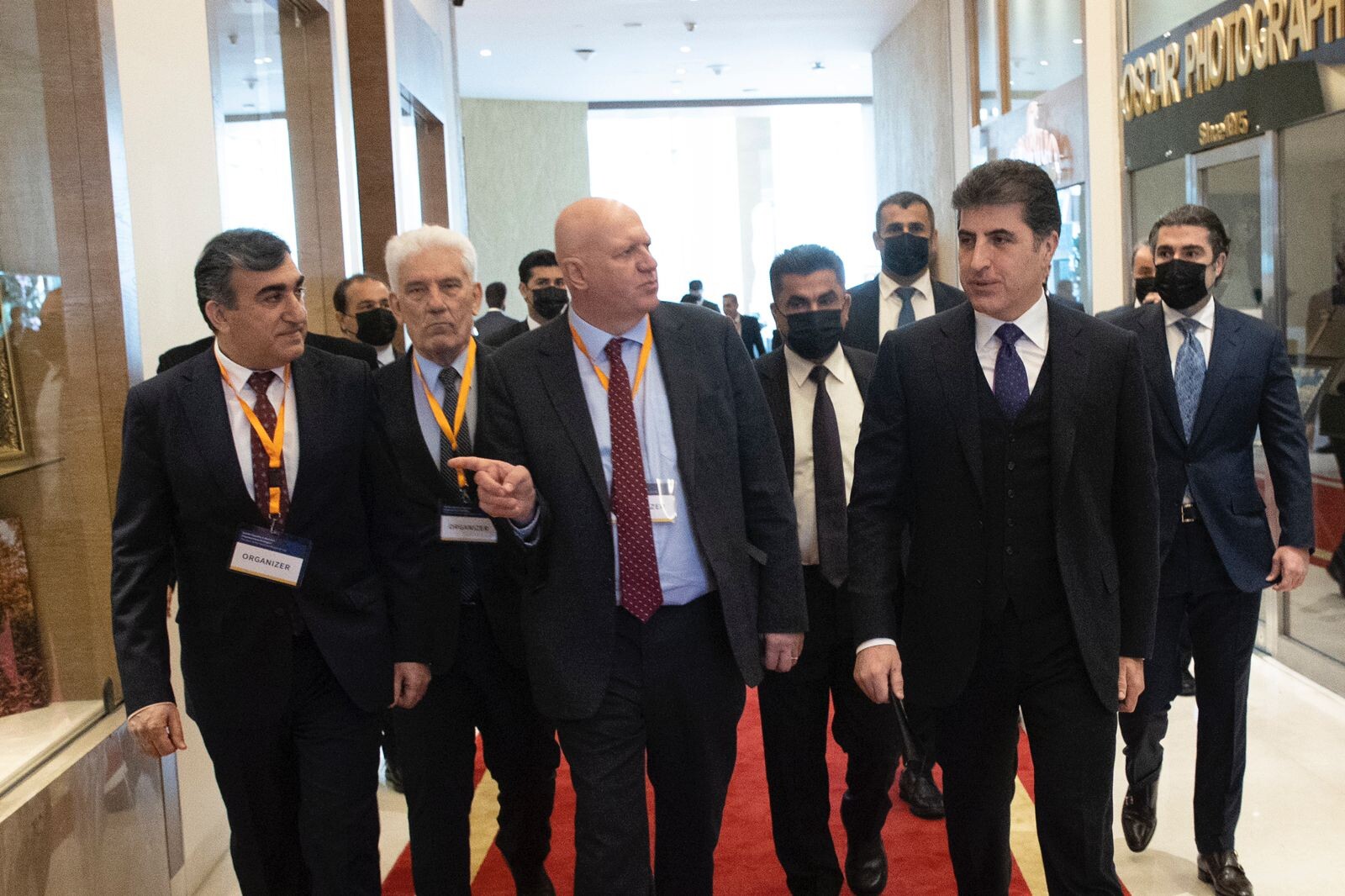
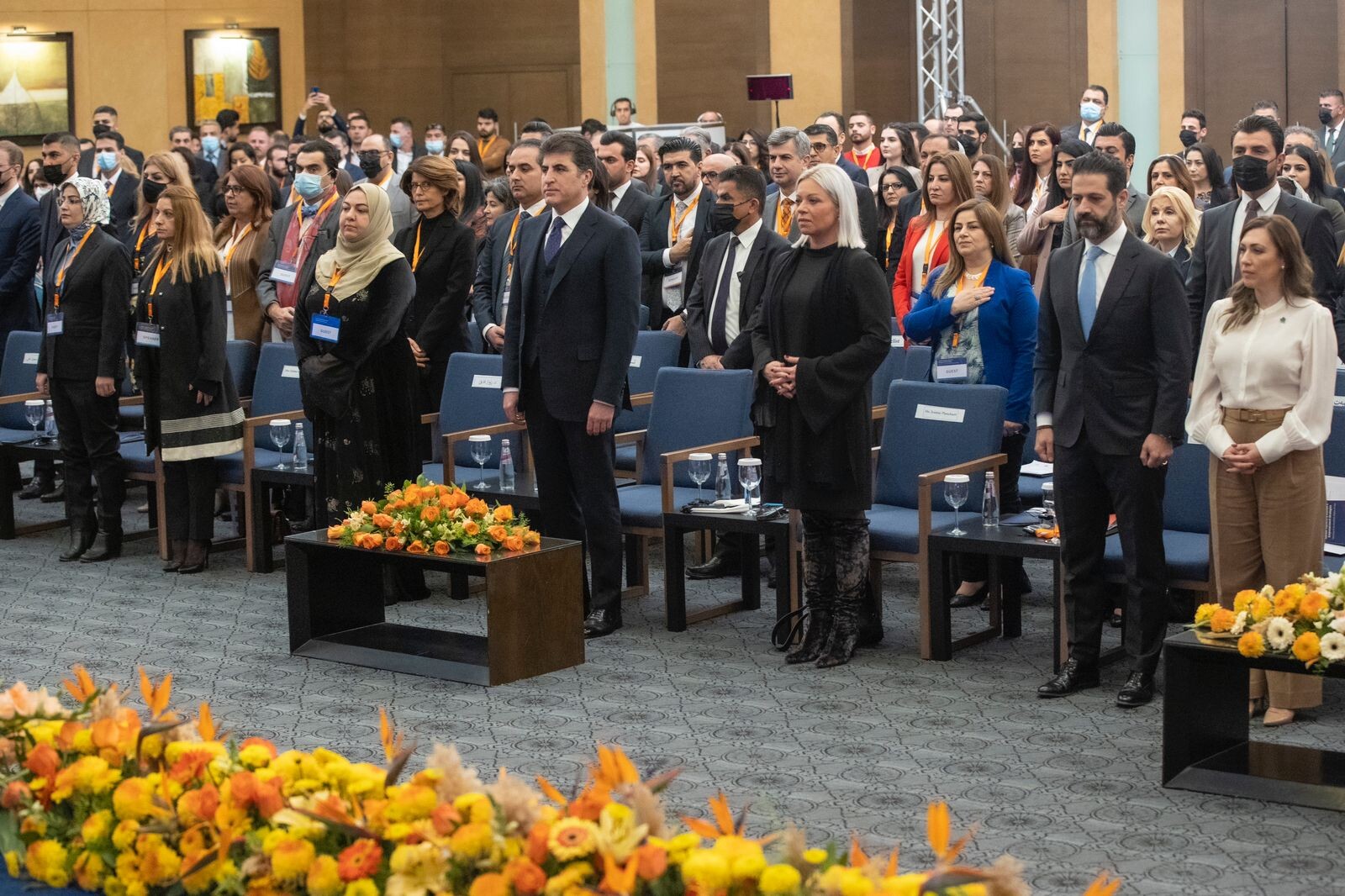
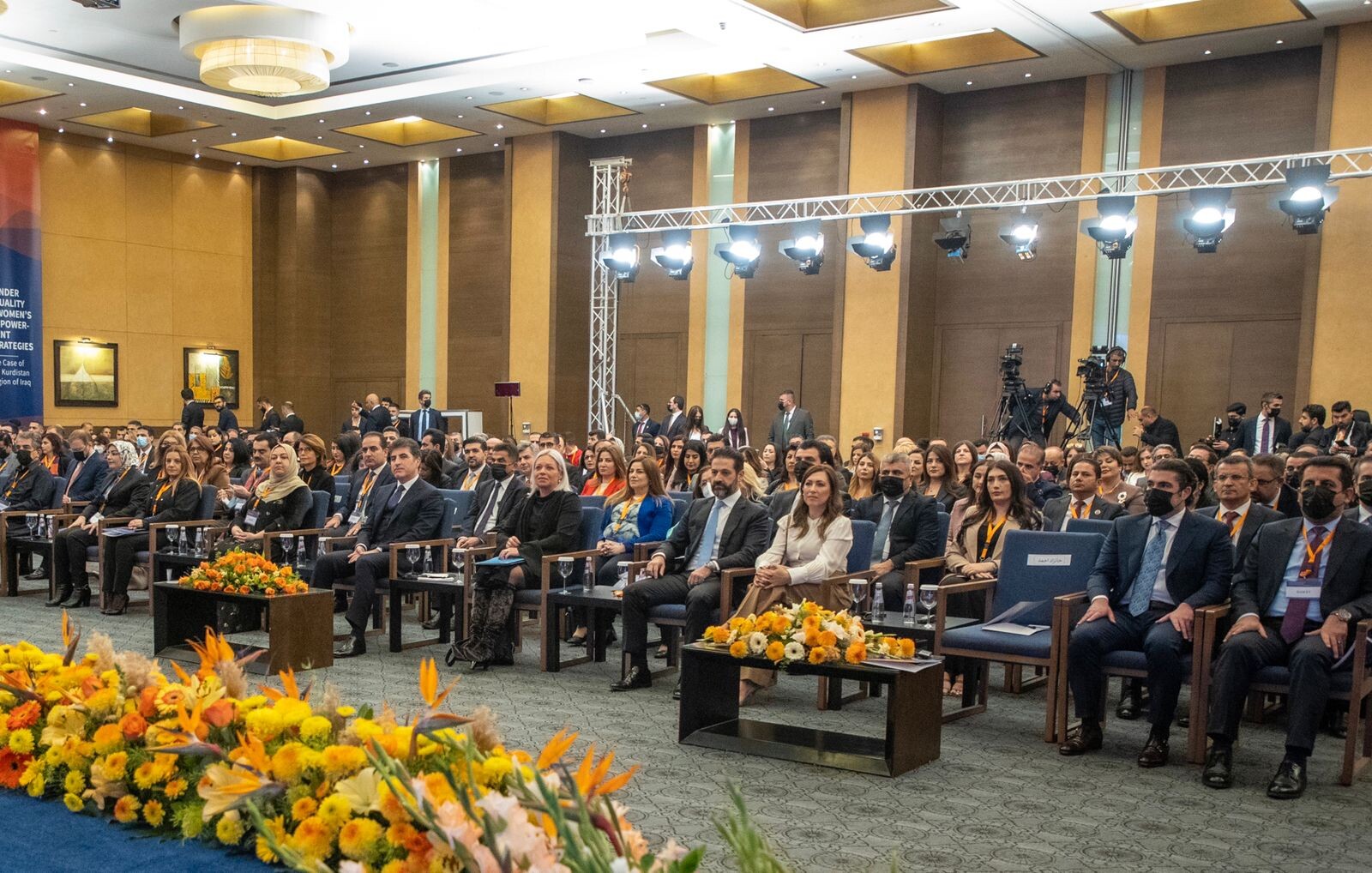
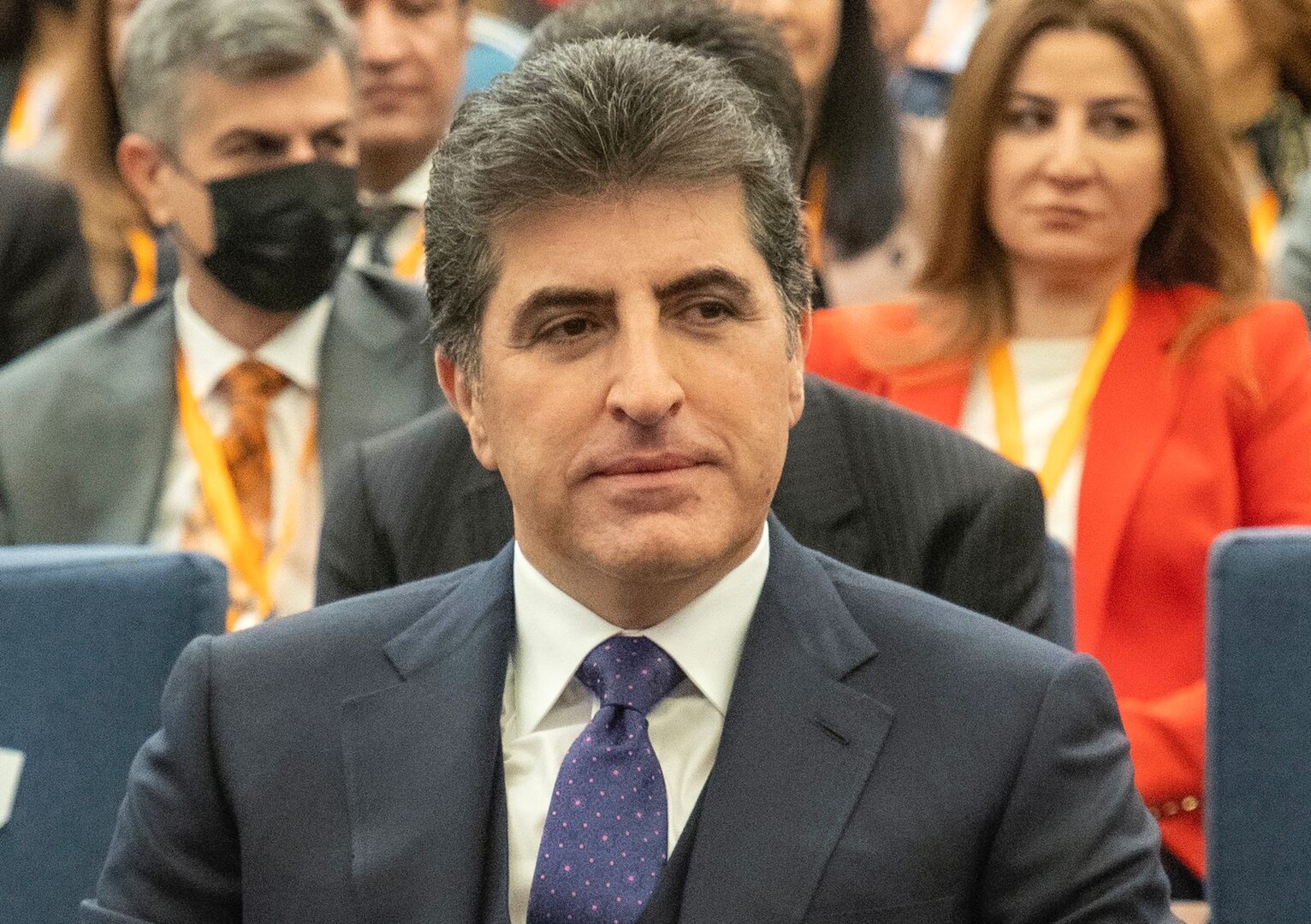
Kurdistan Region President Nechirvan Barzani participated in the “Gender Equality & Women’s Empowerment Strategies: The Case of the Kurdistan Region of Iraq" conference in Erbil on Sunday. The conference was a joint collaboration of four universities of Sulaimani, Dohuk, Erbil and Kurdistan.
The President delivered the opening speech of the conference which was attended by a large group of foreign and domestic guests, experts and academics.
Below is a readout of President’s speech:
Ladies and Gentlemen,
Good morning and welcome all to this conference.
I’m delighted that we, together, take part in this conference on “Gender Equality & Women’s Empowerment Strategies: The Case of the Kurdistan Region of Iraq” which is part of a national campaign to stop violence against women.
I congratulate the universities of Sulaimani, Dohuk, Salahadin and Kurdistan for this joint partnership of special significance for the Kurdistan Region. The collaboration among four universities on a subject like this, is encouraging and an important step forward. Cooperation and partnership among all universities across the Kurdistan Region need to continue on this subject. Hopefully, this conference produces good outcomes and recommendations that will be of great future use for this important mission that has been started in the Kurdistan Region.
I want to welcome all the esteemed guests who have arrived here; I welcome them without saying their names. I welcome them and wish them a great time in Erbil.
Ladies and Gentlemen,
The subject of equality between males and females, boys and girls, men and women is at its core a political issue and related to the individual’s rights in society. If everyone is to equally enjoy their rights, then no gender should marginalize, overlook, deprive, oppress or violate the other.
There are many factors behind the oppression against women in our society, including forced marriages, honor killing, rape, domestic violence and violence outside family, marginalization and subjugation.
Parts of these acts are connected to the wrongful practices of traditions. When we take a stance against these practices, we reduce the oppression against women, and at the same time we erase a harmful cultural norm among us. Other factors may be the misinterpretation of religion. When we outlaw these practices, not only do we protect women, but we also protect religion from such misinterpretations.
What I want to say is that right from the elementary school, our children must be introduced to this culture.
Other considerable factors originate from the individual’s lack of access to proper education and knowledge. Therefore, when we educate a person on the issues of equality and freedom, we also protect women from violence, oppression and subjugation.
This is our conviction:
Communities should not be built in a way that limit the abilities of women, or force them into subjugation. Our efforts are aimed at setting up a society where women as men enjoy the freedoms to develop their abilities, whether in education, arts, politics, professions or in economy.
This means that our work on gender equality is a political response to a set of social constructs that marginalize half of society on the basis of gender discrimination. Here, I would like to shed light on a subject: a great deal is being said about gender equality. I want to share my understanding of the equality between men and women in an overall objective:
Our objective is to found a society in which men and women are equally enjoying the opportunities that come their ways; that they enjoy equal rights; and that they can fulfill their responsibilities equally in a way that both genders are equally offered the opportunity to take part in the economy, and in decision making, in order to realize their own wishes and address their own needs.
Therefore, this subject is larger than equality of inclusion. This topic is related to women’s rights as individuals, and undoubtedly, securing any rights need institutional efforts and laws in the Kurdistan Region. We, in the Kurdistan Region, have worked on both bases of securing the rights of women, through amending the Personal Status Law and through institutionalizing women’s rights.
But achieving equality is only the means to a greater objective, which is the liberation of the individual and the liberation of women.
Liberation has two connotations:
Liberation from oppression, and liberation in order to fulfill their duties. This is our belief that these two sets of freedoms are in the interest of women. At first, we must liberate women from a number of burdens that restrict and curtail their abilities. When we manage to do that, women are free to find their abilities in their communities.
First: liberating women from inequality is only one of the two steps. There are a number of other steps such as liberating them from violence (inside familys and in society), liberating them from lack of income sources and from poverty, liberating them from social oppression and unemployment in their communities.
Second: Liberating them to fulfill their obligations. Women are free only when they have a mission to fulfill. They are free only when they are treated as an active actor in society and are offered opportunities to voluntarily choose the areas where they can realize their potentials and serve their communities in the best possible ways.
If women are free in this sense, while exercising their roles as mothers, they can fully enjoy their own independent economy equally as men. They can become doctors, engineers, teachers, writers, researchers, critics, politicians, activists, media personalities, professionals, they can even serve within police force and protect social harmony, or serve as Peshmarga and protect their land and country. They can become presidents if they wish so; and that would not be an issue.
Therefore, women should not be separated from their skills, because by marginalizing them, society as a whole will lose. Women must not be forced to make impossible choices: to abandon one option only to be able to pursue another.
For instance, to choose between staying at home or working outside. That is not right. But in truth, conditions at home must be in way that support her work outside. Her work outside should be in a way that it will not harm her position and her obligations at home when she decides to become a wife or a mother.
This belief is not a mere slogan, but it is our vision.
This vision has three dimensions: the critique, the perspective and the roadmap.
It is a critique of the monopolization by men. This monopolization must be corrected in order for women to take part in life. All efforts must be excreted to realize this objective.
Furthermore, it is a perspective: we envisage a society that is rich of the inventions of both men and women and their participation, so that both genders are sovereign and add to the greatness of life.
And finally, it is a roadmap: because over the past 20 years, we have effectively worked on three mechanisms to reduce marginalization of women in all aspects of daily life:
First: by amending the laws, especially the Iraqi Personal Status Law. Particularly the laws of 1959 and 1969 to eliminate violence against women.
Second: by institutionalizing the equality between both genders, especially supporting women in state institutions and restructuring these institutions in a way that protect women’s roles and status.
Third: by encouraging women to take part in politics, especially by increasing women’s quota in the parliament from 25 percent to 30 percent with the objective of increasing women’s participation in legislation and decision-making.
Ladies and Gentlemen,
In short, our work is to empower and support women so that they can realize their potentials. Yes, we can say that we have been able to provide fundamental support to the question of gender equality, but there are still many obstacles. We need to do our utmost to remove all these obstacles that face the Kurdistan Region in this respect. To eradicate them, we need both genders’ support. This collaboration will be fruitful only when both genders recognize one another, complete one another, and come together in mutual respect and common values.
In fact, our nation, culture and faith have decided for us that men and women complete one another, support one another, create life together; that they have equal values, are equally important to build up life, to sustain it and to continue. None of these values contradict religion or culture, as they are shared values and common objectives. It is important that they do not oppress one another; neither of the two. And the foundation to end suppression is through preserving rights.
Some of the men look at me as if they are really oppressed.
It is therefore important that both genders enjoy equal rights, have equal responsibilities, that their differences are recognized and they are offered equal opportunities. This is why when there are mutual affection and respect inside and outside of family, in public and private spheres, men and women come together, and the results will benefit society as a whole. The outcome is an enlightened, free and progressive society.
Let us bear in mind that:
The obstacles before women do not solely come from men. If there is an oppressive man, then he should be restrained and prevented. But sometimes the one who oppresses women can be another woman who needs to be educated. Or there could be wrongful traditions which need to be eradicated; there could be some laws that need to be amended; there could be religious interpretations that need to be corrected; it could be even a political system which needs to open up further for women participation.
Women need to be free. Free from violence, restrictions and oppression, in order to play their part in developing different areas of education and learning, their political and economic participation and contribution in both public and private spheres, on equal terms as men.
Our objective is that not only should women feel at ease and be protected at home, but that they should enjoy the same feeling and protection outside of home and be able to become effective actors in developing their communities.
In conclusion,
Here, I would also like to pay tribute to two productive women activists, the late Muhabad Qaradaghi and Namam Ghafoori who contributed greatly in this field but unfortunately passed away due to corona implications.
Also, on such occasions as today, we always pay tribute to the renowned thinker Mustafa Zalmi whose many efforts and endeavors contributed greatly to preserving women’s rights and equality, especially through legislations and laws.
May they rest in peace, and tributes to their memories.
I reiterate: we support all efforts and struggles of women to realize their rights and will support and join their battle. This will be our never-ending strategy and agenda.
I would also like to thank religious clerics who immensely supported the Kurdistan Regional Government at the time to bring about a better understanding about women’s rights in society. I hope they continue to work for a better understanding of equality, women’s rights, violence; this needs to be your daily mission, God willing.
Thank you all, for listening. I wish you a great day and hope that this conference is serious and takes its mission seriously. I wish you success.
Welcome all and thank you.









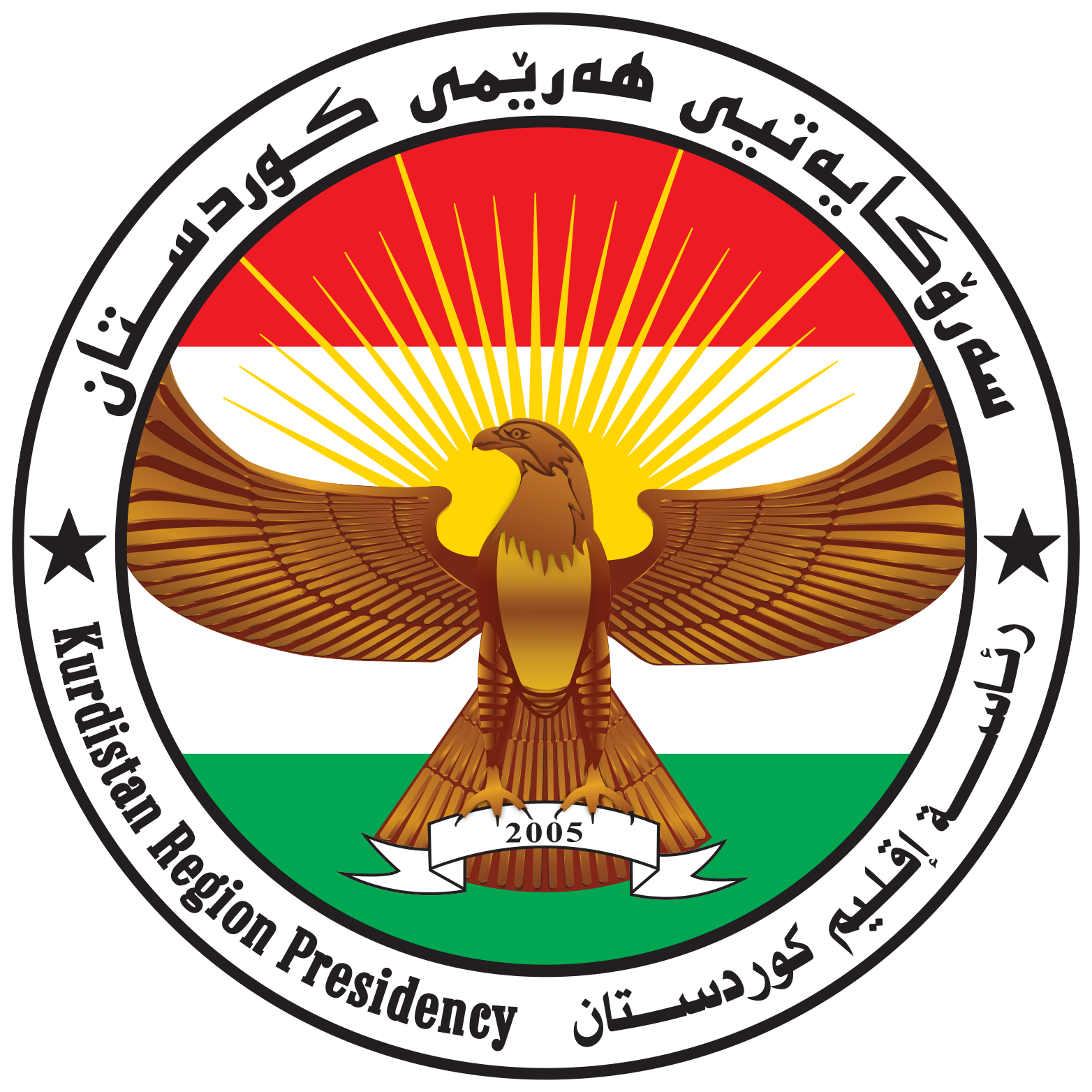

 پەرلەمانی کوردستان
پەرلەمانی کوردستان
